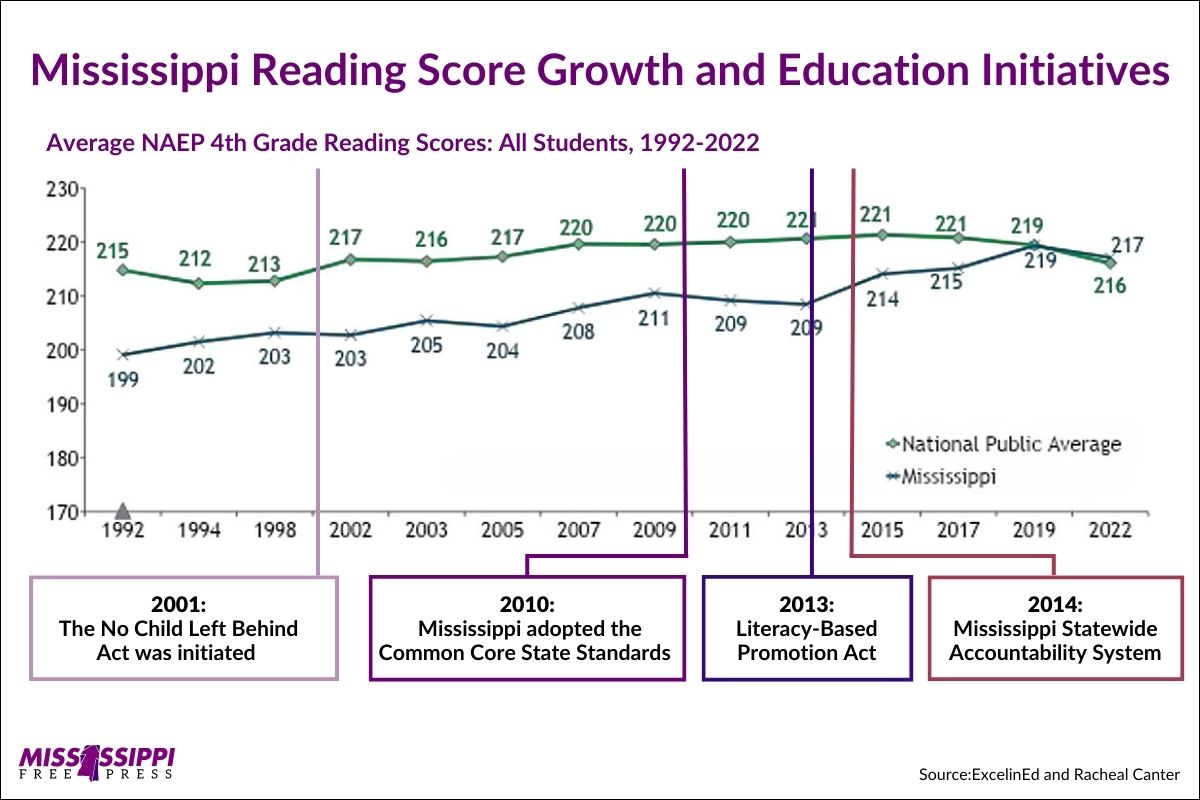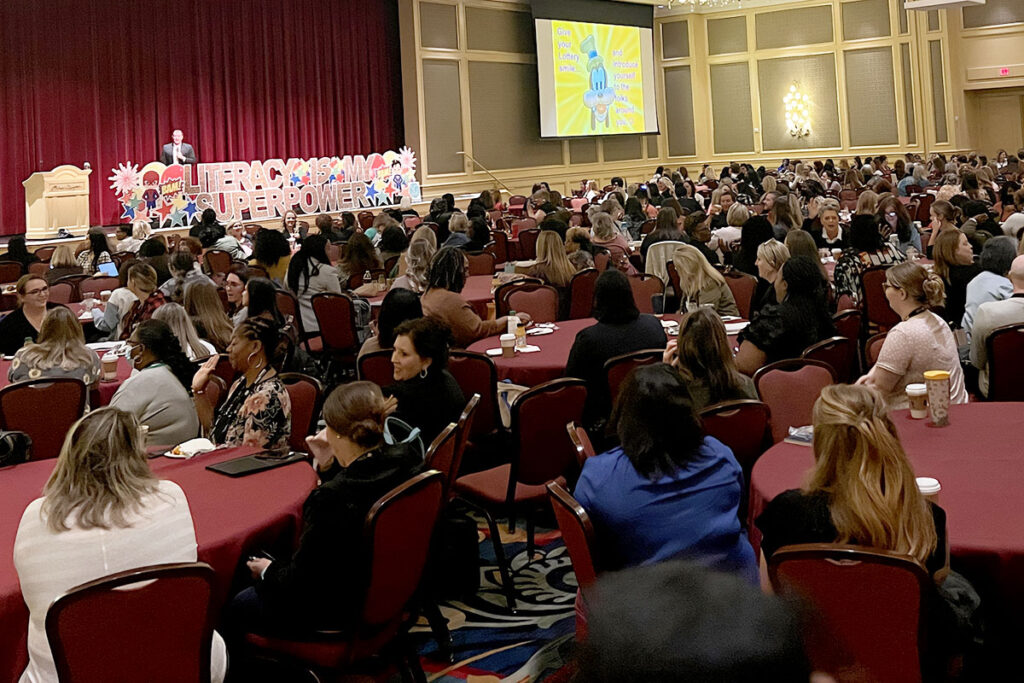BYRAM, Miss.—Ariel Brown looked out at the group of third-grade students in front of her. It was the first day of the week and the first time she introduced sequencing.
“How do you get ready for school in the morning?” she asked.
Hands went up in front of her. After listening to a few answers, she offered out-of-order scenarios such as rinsing their mouths before brushing their teeth or putting on shoes before socks. The students shook their heads, letting Brown know that those ways would not work.
“You were giving me your morning in sequential order,” she said. “You were putting it in order so that I know how it’s done.”
Brown’s third-grade English Language Arts classes at Gary Road Elementary in Byram, like others across the state, are assessed each year for reading proficiency before students can move to the fourth grade. Gary Road showed an increase in the percentage of students scoring advanced on the state’s third-grade reading-score results released this Aug. 17, 2023.
“(My principal) personally sent me a text and let me know that I had some kids that were like level three, which we call like our bubble kids, that definitely moved to like four and five,” she told the Mississippi Free Press. “So four would be proficient, which is where we want all kids to be at and then level five is advanced.”
The release of the state’s test scores last week showed continued improvement across grade levels and subject areas. Mississippi has made headlines across the country for what some are lauding as the “Mississippi Miracle.” Between 1992 and 2019, Mississippi made a 20-point gain in the National Assessment of Education Progress, or NAEP, average scale score. With the release of the 2022 report card, the state has narrowly risen above the NAEP national average.
NAEP provides results on student achievement, instructional experiences, and school-environment factors for the nation, states and participating urban districts. The U.S. Department of Education is given a sample of schools whose students reflect the varying demographics of the state or jurisdiction.

The test is given every two years to a representative group of schools and students across the country. Within each selected school and grade to be assessed, students are chosen at random to participate in NAEP and are representative of the school’s demographic.
State lawmakers took to the airwaves to praise the state’s success, lauding Mississippi’s robust literacy plan. However, understanding Mississippi’s success is not as simple as it appears.
Years of Hard Work and Slow Progress
Much of the current conversation is about the last 10 years of progress. However, a closer inspection shows almost continued growth since the state began participating in NAEP testing in 1992. Across that two-decade timeframe, lawmakers passed several pieces of state and national legislation that affected the educational landscape.
The No Child Left Behind Act debuted in 2001, for example, and in 2010, Mississippi adopted the Common Core State Standards for English language arts and mathematics. In 2014, following the adoption of the Literacy-Based Promotion Act was the implementation of the Mississippi Statewide Accountability System.
Mississippi First Executive Director Rachel Canter says that recognizing the shifts in the data after each of these measures as well as how those laws affect students who took the NAEP exam is important because the examination of these trends helps show a complete picture of the gains.
“Mississippi has been on a 20-year climb toward that national average in reading and math, particularly at the fourth-grade level and also a long-term gain and improvement at the eighth-grade level,” Canter said. “It’s certainly not something that happened overnight. If you go back and look, you’ll see that Mississippi has made steady progress actually in the last 20 years, improving its scores overall as well as at every subgroup level.”

Canter asserts that the No Child Left Behind federal legislation required the state to establish and enforce a strict accountability system, which prompted a stronger focus on proven student achievement.
“People have a lot of feelings about No Child Left Behind, but what it did mean is that suddenly every single student mattered in a way that they hadn’t before,” she said. “So (there was) that child that sits at the back of the classroom with their head down, and they are a behavior problem. Maybe in the past no one would have tried to intervene beyond a couple of attempts, but now that child also has to achieve.”
“If you look at our data you can see that in the years following the full implementation of No Child Left Behind we have some significant gains on NAEP in reading and math,” Canter added.
She pointed out another noticeable increase after Mississippi adopted the College and Career Readiness Standards, which were originally the Common Core Standards, as well as when the state’s new A through F school-accountability rating system came online.
“We had new assessments that were more rigorous to match our new standards that came online,” Canter explained. “And in the midst of all of this we also had the Literacy-Based Promotion Act, which passed and then went into effect. … So if you look at the history of what scores look like and where they went, a lot of the gain on that journey to the national average happened before the literacy based Promotion Act was ever passed.”
Ten Years of Intensive Reading Focus
Mississippi’s education specialists largely credit the state’s growth to the Literacy-Based Promotion Act, or LBPA, which passed in the spring of 2013. Mississippi legislators adopted a robust literacy referendum that revamped how teachers approached reading instruction and provided increased education and training for elementary-school teachers.
Then-Gov. Phil Bryant, who was very vocal about his academic struggles, championed the legislation that emphasizes grade-level reading skills specifically in grades K through 3. The state Legislature poured an initial $9.5 million into the program the first year and has sent $15 million in subsequent years. Kymyona Burk, former Mississippi Department of Education state literacy director, led the implementation of the law.
“In our Literacy Based Promotion Act, the main goal was to prohibit social promotion and to ensure that children who were leaving third grade were actually ready to transition to fourth grade, where they go from learning how to read with those foundational skills to reading to learn,” Burk, senior policy fellow at ExcelinEd, told the Mississippi Free Press. “As we know in fourth grade, the texts become more complex. (They use) more informational texts, which will require students to be able to use all of those foundational skills to comprehend.”
The LBPA includes what is commonly known as the third-grade gate. The Mississippi Department of Education requires each third-grade student who takes the state-wide assessment to achieve a certain score to be considered proficient. Beginning in the 2014-2015 school year, students scoring below that score cannot be promoted to fourth grade without a good-cause exemption. Students who fail initially have two more opportunities to take and pass the exam. They receive additional support interventions, a summer-reading intensive and an additional 90 minutes of reading instruction during the regular school day.

With the implementation of the Literacy-Based Promotion Act, the Mississippi Department of Education began training teachers in the science of reading. The science of reading is a body of research based in education, cognitive psychology, developmental psychology and neuroscience that explains how individuals learn to read. It also includes best practices for reading instruction.
“(The science of reading) increases teachers’ knowledge as to how to teach children how to read and how the brain learns to read,” Burk said. “The national reading panel says that of course there are five major components of reading, which include phonemic awareness, phonics, vocabulary, fluency, and the goal is comprehension.”
“The professional-development system is not a program,” she continued. “It is knowledge-building for teachers so that (regardless) of the curriculum that their district chooses—hopefully one that is grounded in the science of reading and not whole language or balanced literacy—they will better understand how to implement that curriculum because of this knowledge that they have.”
The department also worked to ensure that teachers and districts understood that they were receiving support from the state level and placed trained literacy coaches in the lowest-performing schools.
“We had to change the perception of (MDE) from being this auditing arm to actually being a support system on the ground with teachers. Putting coaches in those schools was one way we did that,” Burk said. “You can go to professional development, but if you come back to the classroom and no one’s really requiring you to do it, monitoring if you do it or helping you to make this transition, then there’s really no accountability for changing your practice. So literacy coaches being in those schools really helped teachers to transfer theory to actual practice in classrooms with their students.”
The Mississippi Department of Education has continued to add support components to the program. During COVID, state-employed literacy coaches recorded lessons on the Mississippi Public Broadcasting Network. MDE has expanded their Strong Readers Strong Leaders website to include activities from birth to grade 5 as well as ideas that parents can implement using common household items. Aspiring elementary teachers now must also pass a certification exam that is based on their knowledge of the science of reading.
“We had done a really good job with training our teachers,” Kristen Wynn, the state’s literacy director, told the Mississippi Free Press. “We put a lot into them because of the direct impact they have on student achievement, but our leaders in the building and at the district level—that was where I saw the biggest need. And so I’m just really making sure that our leaders have the same amount of knowledge or more (as) our teachers (so that they may understand) why literacy instruction should be taught this particular way.”
Proficient Readers Build Strong Communities
Some say that the “Mississippi Miracle” is simply not true. The Los Angeles Times published a piece that took aim at the state’s third-grade retention program, stating that it skews the data. Canter counters that arguments like these are why it is imperative that education experts examine the entire 20-year timeline and credit the state’s increasing standards, increasing the rigor in assessments and evolving accountability systems.
“The reason that (argument) is bad is because it ignores the actual history of our gains, which started well before 2019,” Canter said. “It also ignores the actual timeline of when the Literacy-Based Promotion Act went into effect and how many kids were actually being held back in that time period.”

As leader of the department, Wynn is now focusing on continuing the progress that has been made thus far. One major push toward this goal is to expand the literacy programs’ focus into higher grade levels.
“We need a continuation of our policy to not just stop at third, fourth or fifth grade,” Wynn said. “We also need the same support and resources in funding so that we can extend this to eighth grade—because by the time they get to high school and they’re taking the ACT, if they’re not scoring a 21 or 22, then they’re not even ready for post-secondary work.”
Mississippi educators, lawmakers and parents tend to agree on one thing: Increasing literacy rates is vital to the state’s overall growth.
“Literacy is so important to our communities across Mississippi,” Wynn said. “If we want really strong communities, if we want to build our communities, we have to make sure our students are proficient readers.”
“It’s an educational issue, but it’s also an economic issue,” she added. “Because if students aren’t reading proficiently by third grade, the research tells us they’re more likely to drop out of school. If they are Black, Hispanic or from a low-income family, those numbers double and triple. It’s so important in the growth and the economic development of our communities to make sure that we’re all on board to moving our students to proficiency.”










